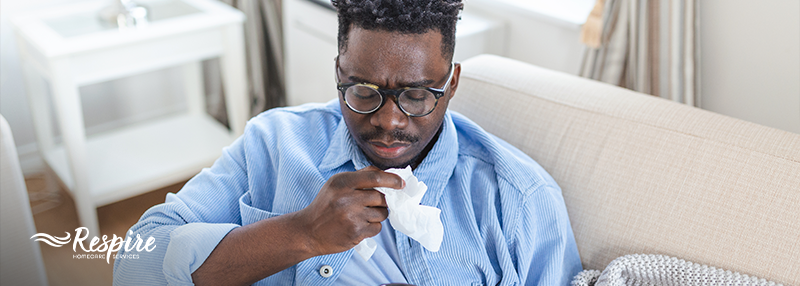Respire Homecare
Updated Fri October 24, 2025
Published Under: CPAP Therapy Sleep Apnea Sleep Therapy

If you’re using a CPAP machine and waking up congested, you’re not the only one. Nasal congestion is one of the most common complaints among CPAP users, especially during fall and winter when allergens, dry air, and travel routines can throw your therapy off track.
This guide will help you understand why congestion happens, what seasonal factors may be contributing, and how to troubleshoot the issue so you can breathe more easily and sleep better.
Why CPAP Users Wake Up Congested
Continuous Positive Airway Pressure (CPAP) therapy is a gold standard treatment for obstructive sleep apnea. It works by delivering a steady stream of air to keep your airway open while you sleep. But that airflow can sometimes irritate your nasal passages, especially if your setup isn’t optimized for comfort.
Here are the most common reasons CPAP users wake up congested:
1. Dry Air and Low Humidity
CPAP machines deliver pressurized air, which can dry out your nasal passages. If your humidifier settings are too low, or if you’re not using one at all, you may experience:
- Stuffy nose
- Dry throat
- Nosebleeds
- Increased mucus production
2. Allergens in the Air
Seasonal allergens like ragweed, mold, and dust mites can trigger inflammation in your nasal passages. This is especially common in fall and winter when:
- Leaves decay and release mold spores
- Indoor heating stirs up dust
- Pets spend more time indoors
3. Dirty Equipment
Filters, tubing, and masks can collect dust, pollen, and bacteria. If not cleaned regularly, they can worsen congestion and even lead to sinus infections.
4. Mask Fit and Type
A poorly fitting mask can cause air leaks that dry out your nose or eyes. Nasal pillow masks may be uncomfortable if you’re already congested, while full-face masks can feel claustrophobic.
5. Mouth Breathing
If you breathe through your mouth while using a nasal mask, you may wake up with a dry mouth and congested nose. This can also reduce the effectiveness of your therapy.
Seasonal Factors That Make Congestion Worse
Fall Allergies
Fall brings a spike in allergens like ragweed, mold, and dust. These can inflame your nasal passages and make CPAP therapy uncomfortable.
Tips:
- Use a HEPA filter in your bedroom
- Keep windows closed during high pollen days
- Shower before bed to remove allergens from your skin and hair
Winter Dryness
Cold air holds less moisture, and indoor heating systems dry it out even more. This can lead to:
- Irritated nasal tissues
- Increased mucus
- Static electricity (which can affect CPAP tubing)
Tips:
- Use a heated humidifier with your CPAP
- Add a room humidifier to your bedroom
- Stay hydrated throughout the day
Holiday Travel
Traveling during the holidays can disrupt your CPAP routine. Changes in altitude, air quality, and sleeping environments may lead to congestion.
Tips:
- Bring your CPAP machine and accessories in a dedicated travel case
- Use distilled water for your humidifier
- Adjust humidity settings based on your location
Troubleshooting Tips for CPAP-Related Congestion
1. Adjust Your Humidifier Settings
If you’re waking up congested, your humidifier may not be set high enough. Try increasing the humidity level gradually until symptoms improve.
If you’re using a heated humidifier, make sure the water chamber is filled with distilled water and cleaned regularly.
2. Switch to a Full-Face Mask
If nasal congestion is persistent, consider switching to a full-face mask. This allows you to breathe through your mouth without compromising therapy.
3. Use a Saline Rinse Before Bed
A gentle saline rinse can clear allergens and mucus from your nasal passages. Use a neti pot or saline spray about 30 minutes before putting on your mask.
4. Clean Your Equipment Weekly
Disinfect your mask, tubing, and humidifier chamber at least once a week. Replace filters monthly or as recommended by your provider.
5. Try a Chin Strap
If mouth breathing is causing dryness and congestion, a chin strap can help keep your mouth closed during sleep.
6. Talk to Your Doctor About Allergies
If seasonal allergies are a major trigger, ask your doctor about antihistamines or nasal corticosteroids. These can reduce inflammation and improve CPAP comfort.
When to Seek Help
If congestion persists despite adjustments, it’s time to talk to your sleep specialist or equipment provider. You may need:
- A different mask style
- A machine with auto-adjusting pressure
- ENT evaluation for chronic sinus issues
Persistent congestion can lead to poor sleep quality, reduced therapy compliance, and increased health risks. Don’t ignore it — get help early.
Travel Tips for CPAP Users
Whether you're heading to a family gathering or escaping to warmer weather, travel can disrupt your CPAP routine. Here’s how to stay on track:
Before You Go
- Pack your CPAP in a carry-on bag
- Bring extra filters, mask cushions, and distilled water
- Carry a copy of your prescription
During Travel
- Use a travel-sized CPAP if available
- Adjust humidity settings based on climate
- Avoid allergens by keeping hotel windows closed
After You Arrive
- Clean your equipment before first use
- Check for air leaks or pressure changes
- Monitor your symptoms and adjust settings as needed
Don’t Let Congestion Derail Your Therapy
Waking up congested can be frustrating, but it’s often fixable. With the right adjustments, seasonal awareness, and support from your care team, you can enjoy restful sleep and effective CPAP therapy all year long.
If you’re struggling with congestion or need help optimizing your setup, Respire Homecare is here to help. Contact us to schedule a mask fitting, equipment check, or humidifier upgrade today.
Comments